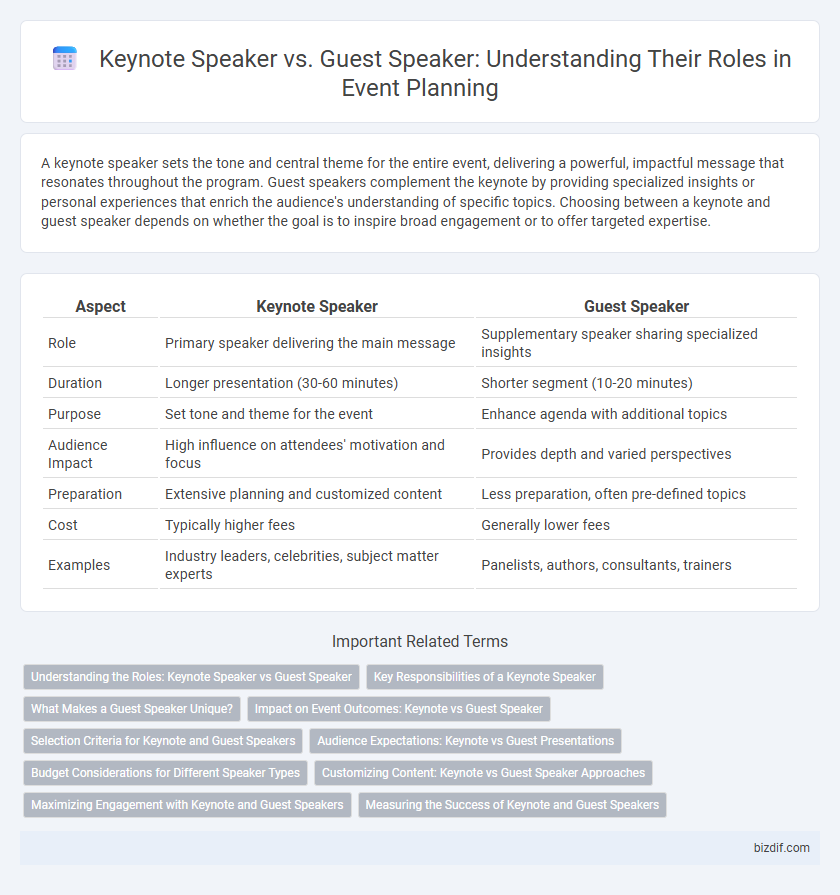A keynote speaker sets the tone and central theme for the entire event, delivering a powerful, impactful message that resonates throughout the program. Guest speakers complement the keynote by providing specialized insights or personal experiences that enrich the audience's understanding of specific topics. Choosing between a keynote and guest speaker depends on whether the goal is to inspire broad engagement or to offer targeted expertise.
Table of Comparison
| Aspect | Keynote Speaker | Guest Speaker |
|---|---|---|
| Role | Primary speaker delivering the main message | Supplementary speaker sharing specialized insights |
| Duration | Longer presentation (30-60 minutes) | Shorter segment (10-20 minutes) |
| Purpose | Set tone and theme for the event | Enhance agenda with additional topics |
| Audience Impact | High influence on attendees' motivation and focus | Provides depth and varied perspectives |
| Preparation | Extensive planning and customized content | Less preparation, often pre-defined topics |
| Cost | Typically higher fees | Generally lower fees |
| Examples | Industry leaders, celebrities, subject matter experts | Panelists, authors, consultants, trainers |
Understanding the Roles: Keynote Speaker vs Guest Speaker
A keynote speaker sets the tone and theme for the entire event, delivering a compelling, central message designed to inspire and unify the audience. In contrast, a guest speaker typically provides specialized knowledge or perspective on a specific topic within the event's agenda, complementing the overall program. Understanding these distinct roles helps event planners strategically select speakers to maximize engagement and achieve event objectives.
Key Responsibilities of a Keynote Speaker
A keynote speaker sets the tone and central theme of an event, delivering a compelling message that aligns with the event's goals and audience interests. Their key responsibilities include inspiring attendees, providing thought leadership, and driving engagement through a well-crafted speech that captures the core purpose of the gathering. Unlike guest speakers, keynote speakers often prepare extensively to ensure their presentation is memorable and impactful, leaving a lasting impression that shapes the overall event experience.
What Makes a Guest Speaker Unique?
A guest speaker brings specialized expertise or a unique perspective that complements the event's theme without the ongoing commitment of a keynote speaker. Their role often includes engaging niche audiences with fresh insights or personal stories that enhance the overall program. This targeted contribution distinguishes guest speakers as valuable assets for creating diverse and dynamic event experiences.
Impact on Event Outcomes: Keynote vs Guest Speaker
Keynote speakers deliver central messages that define the event's theme, significantly shaping audience engagement and overall impact, while guest speakers provide complementary insights that enhance specific sessions without altering the event's core narrative. The presence of a keynote speaker often drives higher attendance rates and stronger media coverage due to their authoritative influence and reputation. In contrast, guest speakers contribute depth and variety, enriching content diversity but typically yielding a more localized impact on event outcomes.
Selection Criteria for Keynote and Guest Speakers
Selection criteria for keynote speakers emphasize expertise, reputation, and the ability to inspire a broad audience, often requiring proven public speaking skills and relevance to the event's main theme. Guest speakers are chosen based on specific knowledge or unique experiences that complement the event's agenda, with flexibility in presentation style and less pressure on universal appeal. Both require alignment with event goals, but keynote speakers demand higher visibility and engagement impact.
Audience Expectations: Keynote vs Guest Presentations
Audience expectations for a keynote speaker center around a compelling, overarching message that sets the tone for the entire event, often delivered by a high-profile expert or industry leader. Guest speakers are anticipated to provide specialized insights or personal experiences that complement the event's theme without the broad, authoritative scope of a keynote address. Understanding these distinctions helps event planners curate a balanced agenda that maximizes engagement and reinforces the event's core objectives.
Budget Considerations for Different Speaker Types
Keynote speakers typically command higher fees due to their expertise and prominence, making budget allocation crucial when planning events. Guest speakers often have more flexible pricing, allowing event planners to manage costs effectively while still providing valuable content. Understanding the financial impact of each speaker type helps optimize event budgets and maximize attendee engagement.
Customizing Content: Keynote vs Guest Speaker Approaches
Keynote speakers deliver tailored presentations that set the overarching theme and tone of the event, ensuring a cohesive narrative aligned with the organizer's goals. Guest speakers customize their content to address specific topics or audience segments, offering specialized insights that complement the keynote message. Effective event planning balances both approaches to create a dynamic and engaging experience through strategic content customization.
Maximizing Engagement with Keynote and Guest Speakers
Maximizing engagement with keynote and guest speakers involves strategically selecting individuals whose expertise and communication styles resonate with the target audience. Keynote speakers set the tone and focus for the event, delivering impactful messages that inspire and unify attendees, while guest speakers provide specialized insights that enrich the program through diverse perspectives. Effective event planners integrate keynote and guest speakers in a complementary manner, leveraging their distinct roles to maintain audience interest and foster meaningful interactions throughout the event.
Measuring the Success of Keynote and Guest Speakers
Measuring the success of keynote and guest speakers involves evaluating audience engagement, feedback scores, and the achievement of event objectives. Keynote speakers often impact overall event tone and inspire the audience, while guest speakers provide specialized insights that enhance session-specific value. Analyzing post-event surveys, social media mentions, and attendee retention rates offers quantifiable data to assess each speaker's effectiveness.
Keynote speaker vs Guest speaker Infographic

 bizdif.com
bizdif.com